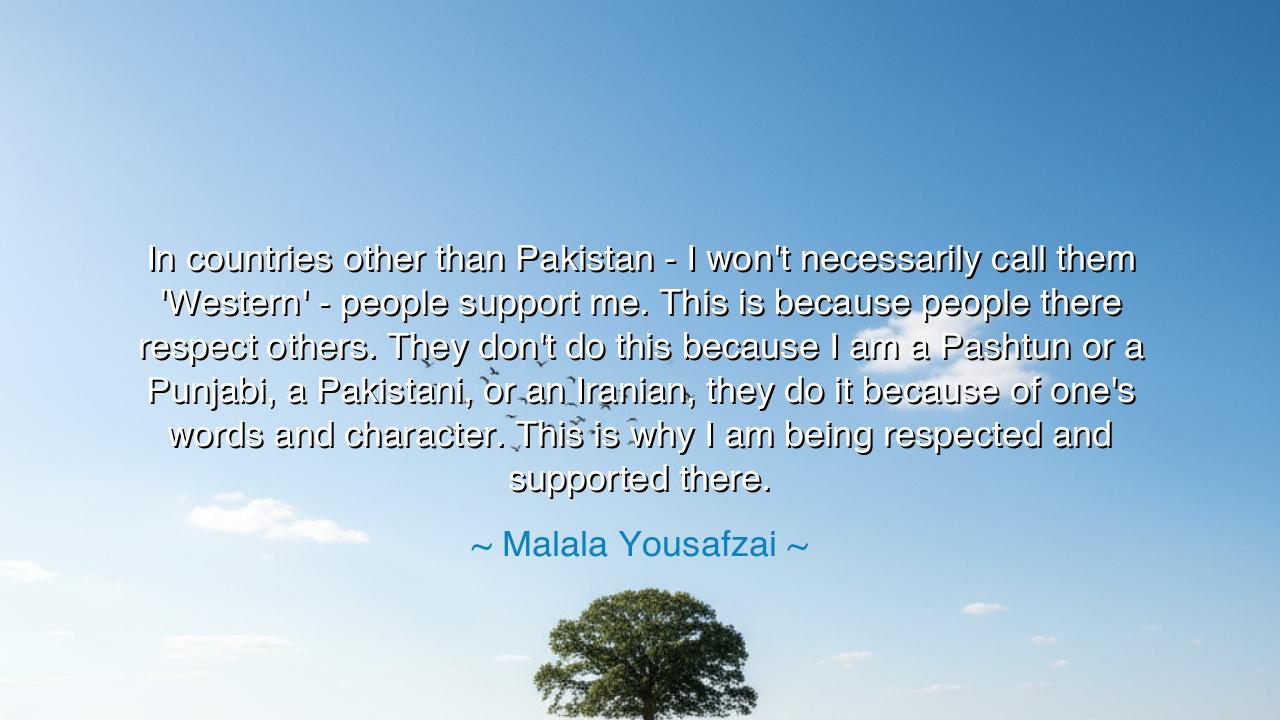
In countries other than Pakistan - I won't necessarily call them
In countries other than Pakistan - I won't necessarily call them 'Western' - people support me. This is because people there respect others. They don't do this because I am a Pashtun or a Punjabi, a Pakistani, or an Iranian, they do it because of one's words and character. This is why I am being respected and supported there.






Hear, O listeners, the words of Malala Yousafzai, who declared with clarity and courage: “In countries other than Pakistan—I won’t necessarily call them ‘Western’—people support me. This is because people there respect others. They don’t do this because I am a Pashtun or a Punjabi, a Pakistani, or an Iranian, they do it because of one’s words and character. This is why I am being respected and supported there.” In this utterance, we find a truth ancient yet ever renewed: that true honor is not bound by tribe or nation, nor by the accident of birth, but by the strength of one’s words and character.
The origin of these words springs from the life of a young girl who, though born in the valleys of Pakistan, rose to speak with the voice of the oppressed across the world. Malala, struck down by violence yet lifted again by faith, speaks not only of her own journey but of a universal law: that respect rooted in the soul transcends borders. When she says others honor her not as Pashtun nor Punjabi, not as Pakistani nor Iranian, but for her spirit and speech, she is bearing witness to the power of human dignity above all divisions.
This teaching calls to mind the wisdom of the ancients. Recall the story of Socrates in Athens, who was condemned not for the accident of his birth but for the boldness of his words. Though the city silenced him with death, his character and teaching outlived his accusers, inspiring distant peoples across centuries. So too does Malala remind us: that what endures is not bloodline or banner, but the truth carried in the heart and spoken with courage.
Her testimony also brings to light the division that often festers within societies. Many in her homeland saw her not as a daughter of all, but as a symbol tied to tribe, to politics, to suspicion. Yet beyond those boundaries, she found recognition not for her origin, but for her message—that every child deserves education, that every girl deserves freedom, that every human life bears value. This reveals a higher order of respect: one that measures a person not by the accidents of birth but by the virtues of spirit.
History offers yet another echo in the life of Nelson Mandela. Though imprisoned for decades in his own land, despised by those who feared his message, he emerged to find respect across nations. The world honored him not because he was Xhosa, not because he was South African, but because his character carried the weight of justice and forgiveness. His story and Malala’s both teach us that when one stands for truth, borders cannot contain the reach of respect.
The emotional strength of Malala’s words lies in their challenge to all of us. For how often do we fall into the smallness of judging by tribe, race, or nation? How often do we honor or despise because of names and origins, forgetting that what truly matters is the heart’s virtue? Malala proclaims a better way: to see with eyes of respect, to weigh not by skin or soil but by truth and integrity.
The lesson is clear: respect must be earned and given on the basis of character, never withheld because of difference, nor granted only for likeness. Let us learn to support the good wherever it is found, even in those who look, speak, or believe unlike us. For in so doing, we honor not only them but ourselves, for we recognize the divine spark that binds humanity as one.
Therefore, let your actions follow this wisdom. Seek out the voice of the honest, no matter their origin. Judge men and women by their deeds and their words, not by the tribe they claim. In your home, in your work, in your nation, teach your children that the worth of a soul is measured by its character. And remember always the cry of Malala: that respect is greatest when it flows beyond borders, lifting the human spirit into unity and peace.






AAdministratorAdministrator
Welcome, honored guests. Please leave a comment, we will respond soon